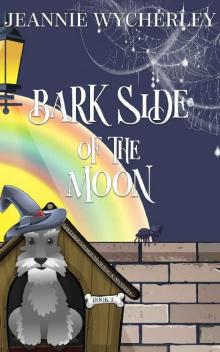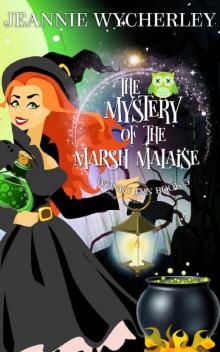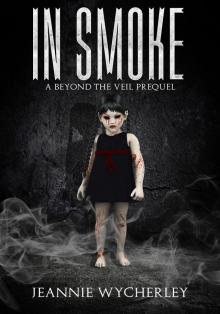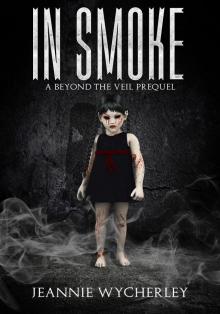- Home
- Jeannie Wycherley
In Smoke eBook ready
In Smoke eBook ready Read online
In Smoke
A Short Story
A Beyond the Veil prequel
Jeannie Wycherley
Copyright © 2018 by Bark at the Moon Books.
All Right Reserved.
No part of this publication may be reproduced, distributed, or transmitted in any form or by any means, including photocopying, recording, or other electronic or mechanical methods, or by any information storage and retrieval system without the prior written permission of the publisher, except in the case of very brief quotations embodied in critical reviews and certain other non-commercial uses permitted by copyright law.
This book was published thanks to free support and training from:
TCKPublishing.com
In Smoke
“You have the mark of death upon you.”
I peered down at the little girl in front of me, open mouthed. Four years of university and twelve months working as a substitute teacher had not quite prepared me for such a statement. I waited for further elucidation but none came. She simply regarded me with her huge grey eyes, her expression difficult to read.
Behind her the other children seemed intent on carrying on with their projects. They chatted among themselves at their tables, busily colouring in and playing with glue sticks, beads and feathers.
This girl, small and slight, with a single long dark plait tied neatly with a green ribbon had walked up to my desk unbidden and placed a calm, cold hand on my arm. Initially I had assumed she wanted to ask to go to the toilet.
“What do you mean?” I asked quietly, hoping none of the other children would overhear.
“You’ll die,” she explained, her voice a monotone. “In smoke.” She made a quiet poofing sound with her mouth, simultaneously motioning with her hands. A tiny explosion.
I laughed nervously. I had experience in teaching children who had overexposure to video games and violent films, but generally found them to be little boys who acted up constantly. This tiny and previously well-behaved girl came across as chillingly calm and earnest.
“Don’t be afraid,” she continued. “You won’t be alone.”
I blinked in astonishment. “What’s your name?” I asked checking the register and seating plan in front of me.
“Cassia Veysie,” she replied and reached out to show me her name on the register. I resisted the urge to slap her hand away, increasingly unnerved by her composure.
“You shouldn’t say things like that to people, Cassia,” I said. “It isn’t nice.”
“My mum told me to always tell the truth,” she replied, her eyes clouding slightly.
Ridiculous. You need to be the person in control of this situation, I reprimanded myself.
I decided a change of subject would be good for us both. “How is your bird of paradise coming along?”
“Do you have any black feathers?” she asked.
“Black? Do you remember earlier? When we were talking about the jungle and the animals that live there?” I’d started the session that morning after introducing myself as the new teacher by showing the class slides of the brightly coloured animals and birds of South America. I’d told them we were going to decorate the classroom with their own gloriously jewelled birds.
Cassia nodded, “Yes Miss.”
“And we didn’t see many black birds, did we?”
“No Miss.”
“So today’s project is to make a lovely cheerful bird.” I pointed Cassia back to her place.
She returned to her seat biddably enough, but as she sat I heard her mutter with some vehemence, “But I like black.”
I watched her as she shuffled through the contents of the plastic containers of craft materials I had placed on each table, her brow furrowed. Once she had located some navy feathers and beads she happily created a smart little bird.
I’m not sure it looked like something that lived in paradise. The way its eyes glittered, it could have originated in a far darker place.
###
It was with relief I arrived home after the first full day in my first permanent position. It felt good. I heated up a ready meal and popped open a bottle of prosecco to celebrate. My lessons for the following day were prepped and ready to go, so for this evening at least I had time to kick back and relax, and watch a movie. I flicked through my DVDs, opted for a recent Sandra Bullock flick and slipped it in the machine. While the DVD whirred into life, I lit a scented candle and slouched back on the sofa, intent on relaxing.
I lost myself for an hour or so, but when the prosecco made me dozy, I gave into it, lying down, my head supported on a cushion, sleeping through the final twenty minutes or so of the film. I dreamt of smoke, as grey as Cassia Veysie’s eyes. When the DVD had finished it turned itself off and my regular TV channel switched on instead. The adverts woke me with a start from the odd dream. Smoke from the spent candle twisted and curled inches from my face, and the scent of sulphur left me nauseous.
To be on the safe side, I took the remains of the candle in its glass candle holder and placed it in the centre of my lawn, well out of reach of my house.
“It’s alright,” I told myself a little later, lying in my big bed, feeling slightly hysterical, “Cassia told me I wouldn’t die alone.”
Tonight at least I would be safe.
###
Having slept fitfully, the next morning I mentioned my encounter with Cassia to my head of year, Mrs Catesby. She smiled when I mentioned the name.
“Ah, she’s a peculiar little creature is Cassia Veysie.”
“She’s says things like this often then?”
“Oh yes, and her mother before her by all accounts. Some of the teachers here knew Jacinta when she was a pupil.”
“Does Cassia have an obsession with death?”
“That seems quite likely. She lives with her mother in the cemetery in an old dwelling place.”
“Seriously? I shouldn’t have thought that’s particularly healthy for her outlook on life,” I imagined some sort of ground worker’s house opening out among the graves. “Is there a father? Can’t social services rehome them?”
“No father on the scene, and I think social services may have had some involvement in the past, but Cassia is healthy and very close to her mother, and Jacinta is stubborn. She won’t move. It’s the family home.” Mrs Catesby shrugged. “Her education isn’t suffering and there’s no sign of abuse, so our hands are tied.”
When I frowned, Mrs Catesby smiled. “You’re very new to post. It pays to remember that we can’t change every child’s world, we can only do our best to make their experience of education the most positive it can be every single day. Don’t let the odd things she says get to you. Take them with a pinch of salt.”
She was right of course.
So why, when I took the morning register, and glanced in Cassia’s direction, could I smell a faint trace of sulphur, and why, when I met her eyes, could I read only sympathy there?
###
Several weeks later, when the children knew me a little better, and I them for that matter, I decided to push them a little farther out of their comfort zone, and every morning for a week, a group of pupils would present a ‘news’ item in a kind of ‘show and tell’. The idea was to report on something that they found important or interesting and bring in an item to show everyone else. For some children this meant the birth of a sibling, or the adoption of a new pet. One child told the class about their recent birthday party, and another about how their Dad had been involved in the Falkland’s conflict, while a third proudly showed us the collection of fossils he had found on the beaches in nearby Dorset.
One by one the children would take their place next to my desk, and lay
their item down for others to inspect. Most of the children were hesitant and prone to faltering, or they would become over-excited and include minute detail that derailed the main impetus of their story.
Cassis Veysie awaited her turn patiently, and when it came, I gestured for her to come to the front of the class and tell everyone her news. She marched to the front her head held high, clutching a large plastic box with a lid on it. Without further ado, she ripped the lid from the box and dumped a pile of wet seaweed onto my desk, splashing the kids in the front row with salty water.
I stood in shock and set about moving my paper and a pile of notebooks out of harm’s way as the rank smelling liquid from the slimy seaweed spread across my desk, children either shrieking or tittering, depending on how close to the action they were located.
“Cassia!” I blurted out, and flung the seaweed from the desk. It landed on the floor with a foul sounding plop, and Cassia stared down at it with surprise.
Collecting myself, I made my way around the front of the desk and scooped the seaweed into the bucket once more. “Tell us your news story, Cassia,” I instructed and turned away to the sink to locate a wad of paper towels to mop my desk with. “Quiet children,” I urged, and Cassia pulled her little shoulders back and began.
“Jim Roberts was a sailor. He joined the merchant navy in 1848 when he was eleven years old. In 1861 he was aboard the Mary Pomeroy when it went down on the rocks in the bay.” I turned back from the sink to see Cassia point at the window in the direction of the seafront. I had only recently moved to Durscombe in order to take up my position at the school, and while I was vaguely aware that the town had a chequered history, I was uncertain of what that amounted to. As if reading my mind Cassia turned to me. “There’s a small plaque to lives lost on the west side of the prom.” She reached to her desk and produced a poster. Two pieces of A4 paper had been sellotaped roughly together. “I took a brass rubbing. It says, ‘Dedicated to the souls lost at sea aboard the Mary Pomeroy on the night of 18th October 1861’.”
She looked around for somewhere to lay her poster and I quickly finished mopping the desk and let her set it down in front of us. Even upside down I could see she had taken great care with the rubbing.
“Jim didn’t want to die. He said the water was cold and the waves were high. And when he jumped in, he was lucky because he could swim, but a lot of the other sailors couldn’t because no-one had taught them how. And some of them were hurt on the rocks. They were shouting and screaming. And they tried to reach the shore but there were people on the shore and they wouldn’t let the sailors come on the sand. They wouldn’t help them. They didn’t save them.”
The children in front of me were rapt, their eyes and mouths wide. One or two looked worried. I wasn’t surprised.
“Cassia,” I started.
“Jim looked up and he saw a pretty woman on the cliffs, she looked like an angel, and she wanted to help him, but she couldn’t.
“Cassia?”
“Then when he got to the shore someone hit him hard and he fell in the water and he was dead.” Cassia finished sadly.
“Thank you Cassia,” I said, deciding I needed to move the conversation on to safer ground. “That’s interesting history about the town, isn’t it? Have you been reading a book about the history of Durscombe?”
“No Miss Parsons. Jim told me.”
I grimaced inwardly and smiled outwardly. Before I could say anything, one of the boys piped up, “How could he have told you, if he was dead?”
I tried to intervene but Cassia retorted, “I saw him and he told me.”
The little boy sniggered. “So he’s a ghost? You’ve been talking to a ghost?” A few children laughed and Cassia flushed.
“Yes.”
“There’s no such thing as ghosts. That’s stupid!”
“That’s enough, Harry,” I said, but other children began to laugh and a few to goad Cassia too.
Cassia balled her hands into fists and faced the class furiously. “There are ghosts. You’re just too blind to see them! They’re around us all the time. They would talk to you too if you let them.”
The class erupted and I clapped my hands sharply. “That’s enough everybody!” When that didn’t restore order instantly I raised my voice. “Quiet!” The tumult subsided. “Back to your seat Cassia and take your seaweed and poster,” I said.
I continued with the lessons till break time, periodically glancing across at Cassia. She met my gaze most of the time, her expression neutral, her eyes clear and unguarded, but occasionally when she didn’t see me watching her I saw her observing a space behind me, her eyes following movement. Several times I turned around to see what she was looking at but there was nothing except the blank whiteboard and a cupboard door.
By the end of the morning’s lessons, the hairs were raised on the back on my neck and I could have sworn someone was standing behind me.
###
The next morning Cassia showed up at school with grazes on her knees, left cheek and forehead. When I asked her what had happened she shrugged. A little girl on Harry’s table giggled, and someone slapped her arm. She shushed. Harry himself remained a study in insouciance.
At lunchtime I kept Cassia back for two minutes and asked her again about her injuries, but she simply said she had been playing and tripped over. I had no choice but to let the matter drop. Nonetheless I found myself watching the children in the playground from my classroom window, looking for any signs that Cassia was being bullied by Harry and his friends. Perhaps they sensed my watchfulness because they kept their distance.
Cassia sat alone on a bench and ate her packed lunch, watching some of the other children with interest. I could only imagine what she must be thinking, and my heart ached for her. In spite of her peculiarities, I hated to see a lonely child.
On a whim, I followed the children out at home time, and observed with curiosity as Cassia picked up speed at the school gate and danced towards the road. I imagined she must have spotted her mother, but instead she stopped ten yards from the school gate, as though to talk to someone her own height. She became increasingly animated, and then skipped to the crossing where she waited, chatting to herself all the while.
The lollipop lady helped the assembled children cross and I watched as Cassia headed happily off towards the promenade, where she would no doubt turn right and head up Moor Road towards the Victoria Gardens Cemetery where she lived. The lollipop lady returned to my side of the road and smiled.
“Would you like some assistance crossing?” she asked, and I shook my head.
“What do you make of Cassia?” I asked, indicating the little girl walking away from us.
The lollipop lady followed my finger. “Oh yes. She’s an interesting one, isn’t she? Has an imaginary friend. Every morning she stops, just over there,” she pointed at the corner of the road, “and waits very quietly. And a little later, she will start chatting and walk to the crossing here, and wait for me to collect her. Then she crosses with me, polite as you like, but talking all the time.”
“To thin air?”
“At that age they often have imaginary friends, don’t they?”
“I suppose so,” I replied.
“She tried to introduce me once. I played along.”
Another group of children had gathered and now stood with us waiting to cross, so I walked with them all and hurried after Cassia. I caught her just as she paused on the corner. She waved goodbye to her friend.
“Hi Cassia,” I called and she turned to me.
“Hello Miss Parsons,” she replied, all sense of animation and excitement had disappeared and her face was now solemn.
“Who was your friend?” I asked.
“Bryony,” she replied. “Isn’t she pretty? I’d like shoes like that.”
I almost found myself looking the way Cassia had waved to see what kind of shoes Bryony had been wearing. I studied Cassia’s little face, unsure whether
this really was just a case of an imaginary friend, or something odder. I found myself unable to burst her bubble though. Cassia appeared happier with the imaginary Bryony, than at any other stage since I’d been teaching her.
“What will you be doing this evening Cassia?” I asked.
“I’ll be helping Mummy with her cooking. She’s making medicines,” Cassia said.
“Who’s she making those for?”
“Everyone who needs it.”
I nodded, none the wiser. “That sounds fun. Have a nice evening and I’ll see you tomorrow, I said and watched her as she walked quietly away.
###
An hour later I had finished my prep for the morning and gathered exercise books together to take home with me. As I closed the door of my classroom, Mrs Catesby strolled into view.
“Another day at the chalk face completed,” she said merrily. “Looks like you have plenty to keep you entertained this evening though,” she nodded at the books under my arm.
“Stories,” I said. “They’re the easiest to mark, aren’t they?”
Mrs Catesby nodded. “Has Cassia settled down with you, do you think?”
“Funny you should mention that,” I replied and recounted the incident at the school crossing.
“Hmm,” Mrs Catesby giggled, she seemed to find it amusing. “Did she say what her friend’s name was?”
“Bryony,” I replied.
Mrs Catesby’s face straightened in surprise. “Oh well that is odd. I suppose she could have heard about that from her mother.”
“Heard about what?”
“Six or seven years ago we introduced the crossing patrol. Until then we hadn’t needed one. But the school found the money when a little girl was hit by a car after running out of school and into the road. She would have been about Cassia’s age then.”
“She was hurt?”
“Killed outright. Oh it was very sad. The whole school was shaken up about it. If I recall correctly, that little girl’s name was Bryony. Bryony Wright.”

 Vengeful Vampire at Wonky Inn: Wonky Inn Book 8
Vengeful Vampire at Wonky Inn: Wonky Inn Book 8 The Wonkiest Witch
The Wonkiest Witch Ain't Nothing but a Pound Dog
Ain't Nothing but a Pound Dog The Mysterious Mr Wylie: Wonky Inn Book 6
The Mysterious Mr Wylie: Wonky Inn Book 6 Midnight Garden
Midnight Garden Witching in a Winter Wonkyland: A Wonky Inn Christmas Cozy Mystery
Witching in a Winter Wonkyland: A Wonky Inn Christmas Cozy Mystery The Great Witchy Cake-Off
The Great Witchy Cake-Off The Great Witchy Cake Off: Wonky Inn Book 7
The Great Witchy Cake Off: Wonky Inn Book 7 Midnight Garden (The Extra Ordinary World Novella Series Book 1)
Midnight Garden (The Extra Ordinary World Novella Series Book 1) Bark Side of the Moon: A Paranormal Animal Cozy Mystery (Spellbound Hound Magic and Mystery Book 3)
Bark Side of the Moon: A Paranormal Animal Cozy Mystery (Spellbound Hound Magic and Mystery Book 3) A Gaggle of Ghastly Grandmamas: Wonky Inn Book 9
A Gaggle of Ghastly Grandmamas: Wonky Inn Book 9 The Ghosts of Wonky Inn: Wonky Inn Book 2
The Ghosts of Wonky Inn: Wonky Inn Book 2 Keepers of the Flame: A love story
Keepers of the Flame: A love story Black Bess
Black Bess The Mystery of the Marsh Malaise: Wonky Inn Book 5
The Mystery of the Marsh Malaise: Wonky Inn Book 5 In Smoke eBook ready
In Smoke eBook ready In Smoke
In Smoke